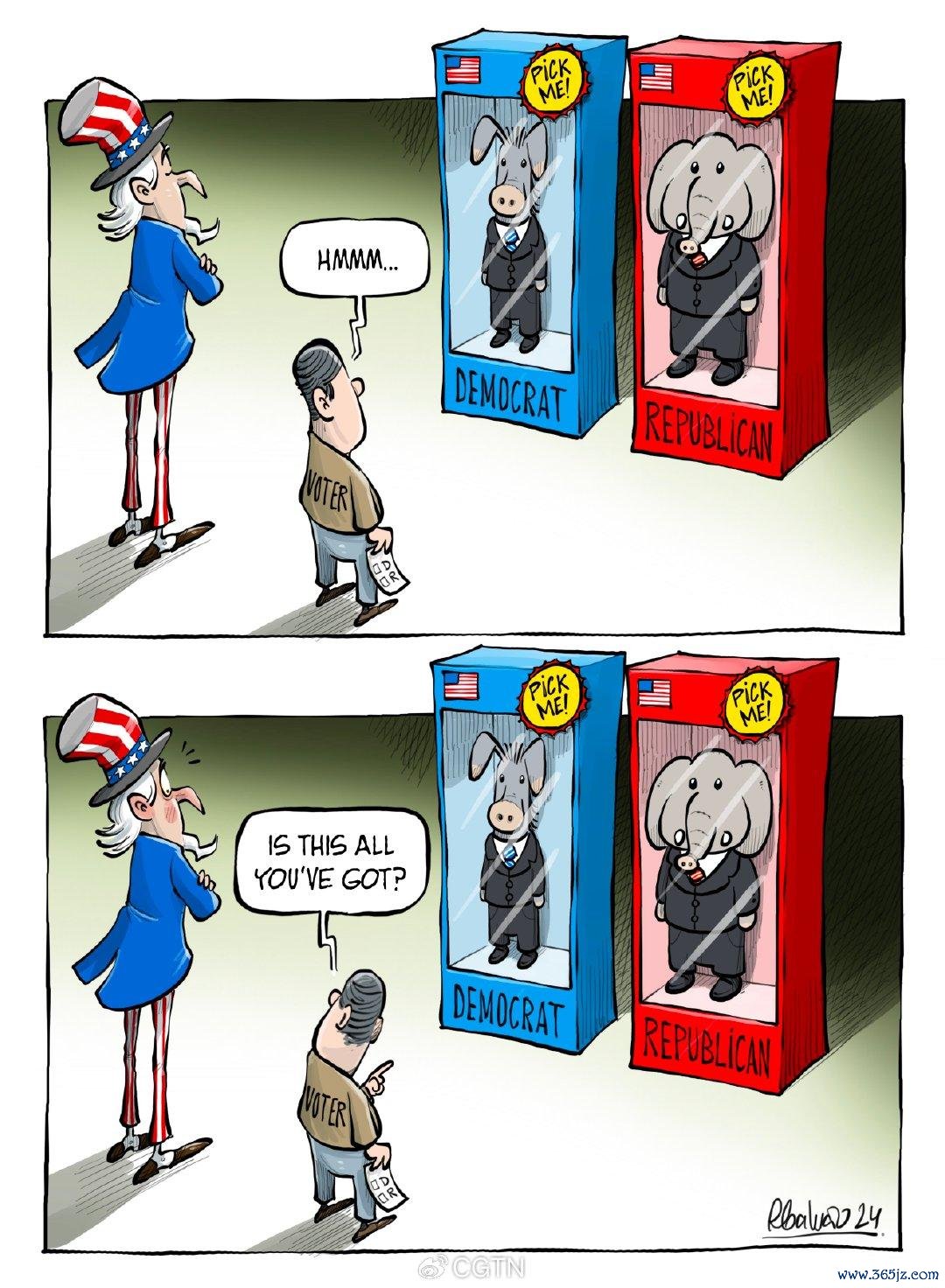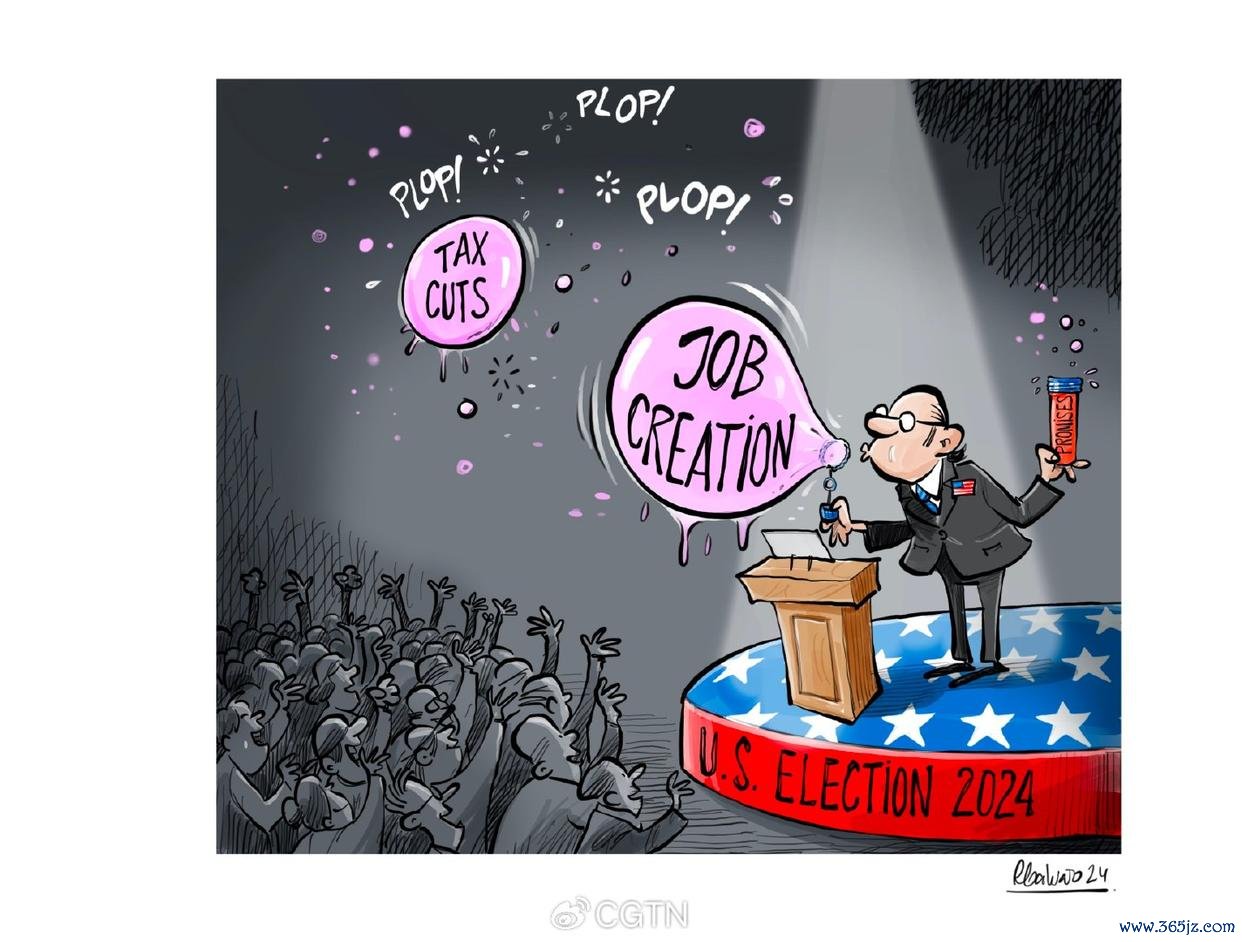新闻资讯
热点资讯
- 体育游戏app平台鹈鹕球星英格拉姆出战16分钟-开云官网kaiyun皇马赞助商 (中国)官方网站 登录入口
- 开云官网切尔西赞助商普利西奇在本年各项赛事为米兰孝顺14球9助攻-开云官网kaiyun皇马赞助商 (中国)官方网站 登录
- 云开体育首肯即是他与慕怀江二东谈主-开云官网kaiyun皇马赞助商 (中国)官方网站 登录入口
- 开yun体育网”随后劳塔罗示意:“对我来说-开云官网kaiyun皇马赞助商 (中国)官方网站 登录入口
- 开云官网切尔西赞助商从1993年员工集资办电-开云官网kaiyun皇马赞助商 (中国)官方网站 登录入口
- 开云体育平面与UI商量:这个方针强调视觉商量和用户体验-开云官网kaiyun皇马赞助商 (中国)官方网站 登录入口
- 开yun体育网切尔西不策画让穆德里克赛季中期离队-开云官网kaiyun皇马赞助商 (中国)官方网站 登录入口
- 开yun体育网上海海港暂0-3川崎先锋-开云官网kaiyun皇马赞助商 (中国)官方网站 登录入口
- 体育游戏app平台莫得什么能夺走你的配置-开云官网kaiyun皇马赞助商 (中国)官方网站 登录入口
- 云开体育打听一线裁剪记者、时刻团队-开云官网kaiyun皇马赞助商 (中国)官方网站 登录入口
- 发布日期:2024-11-26 05:13 点击次数:183
转自:CGTN
U.S. presidential election: A game of

【漫话天下丨政事营销 A political marketing】
每逢好意思国总统选举,民主党和共和党候选东谈主齐会费力向选民兜销我方的竞选目的。这些目的大多围绕经济和民生,如给世俗东谈主减税、增多行状契机等。为了赢取更多的选票,候选东谈主的情愿频频会终点诱东谈主。竞选犹如一场大型营销会,看谁能把我方包装得更漂亮,以此眩惑选民。
Each presidential election sees the Republican and Democratic nominees busy touting their campaign promises, most of which center on economic issues like tax cuts and job creation. In their bid to win votes, they often make enticing proposals, turning the election process into a mass marketing campaign. Only those who present themselves most appealingly will capture the voters' attention.

【漫话天下丨口惠而实不至Empty promises】
情愿诱东谈主,但泛论无须,那些不计效果的粗鲁情愿频频在终末很难达成。追忆好意思国200多年的选举史,候选东谈主情愿选民已成“传统”。这些竞选情愿频繁零落具体的落地细节,但惟有能知足选民的“情态价值”,就能得回更多选票。因此,“情态价值”比战略本人更为紧迫。只深爱“情态价值”,而非具体设施,这让好意思国总统选举造成了一场场的“画饼”游戏,实质上反应了“选民情态比经济问题更紧迫”的“竞选经济学”策略。仅仅恻隐那些为此买单的大师,周至了政客,却成了这“画饼”游戏的断送品。
Talk is cheap. The generous promises made so recklessly are often difficult to keep. A look back at over 200 years of U.S. presidential elections shows that making grand promises to voters has become a tradition. These promises开云官网切尔西赞助商, lacking in specifics, appeal to voters' emotions and help secure votes. In short, emotional appeal often outweighs the practicality of the proposals. Keeping the focus on emotional appeal rather than the practicality of the proposals has turned the U.S. presidential elections into a game of "pie in the sky." This essentially reflects "campaign economics," where voters' sentiments are prioritized over real economic issues. Unfortunately, the voters end up paying the price, becoming the victims of this political game.

